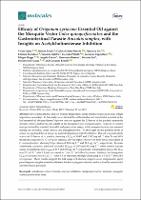Please use this identifier to cite or link to this item:
https://repositorio.usj.es/handle/123456789/289
| Title: | Efficacy of Origanum syriacum Essential Oil against the Mosquito Vector Culex quinquefasciatus and the Gastrointestinal Parasite Anisakis simplex, with Insights on Acetylcholinesterase Inhibition |
| Authors: | López Ramos, Víctor


Roman, Pavela 


Gómez-Rincón, Carlota 

Les Parellada, Francisco 

Bartolucci, Fabrizio 


Galiffa, Veronica Petrelli, Riccardo 

Cappellacci, Loredana 

Maggi, Filippo 
Canale, Angelo 


Otranto, Domenico 


Sut, Stefania 

DallAcqua, Stefano 


Giovanni, Benelli 


|
| Keywords: | Anisakiasis; Contact toxicity; Enzyme inhibition; Fumigation toxicity; Larvicide; Mosquito control; Penetration assay |
| Issue Date: | 15-Jul-2019 |
| Publisher: | MDPI, ST ALBAN-ANLAGE 66, CH-4052 BASEL, SWITZERLAND |
| Citation: | López, V.; Pavela, R.; Gómez-Rincón, C.; Les, F.; Bartolucci, F.; Galiffa, V.; Petrelli, R.; Cappellacci, L.; Maggi, F.; Canale, A.; Otranto, D.; Sut, S.; Dall’Acqua, S.; Benelli, G. Efficacy of Origanum syriacum Essential Oil against the Mosquito Vector Culex quinquefasciatus and the Gastrointestinal Parasite Anisakis simplex, with Insights on Acetylcholinesterase Inhibition. Molecules 2019, 24, 2563. |
| Abstract: | Developing effective and eco-friendly antiparasitic drugs and insecticides is an issue of high importance nowadays. In this study, we evaluated the anthelminthic and insecticidal potential of the leaf essential oil obtained from Origanum syriacum against the L3 larvae of the parasitic nematode Anisakis simplex and larvae and adults of the mosquito Culex quinquefasciatus. Tests on A. simplex were performed by standard larvicidal and penetration assays, while mosquito toxicity was assessed relying on larvicidal, tarsal contact, and fumigation tests. To shed light on the possible mode of action, we analyzed the oil impact as acetylcholinesterase (AChE) inhibitor. This oil was particularly active on L3 larvae of A. simplex, showing a LC50 of 0.087 and 0.067 mg mL(-1) after 24 and 48 h treatment, respectively. O. syriacum essential oil was highly effective on both larvae and adults of C. quinquefasciatus, showing LC50 values of 32.4 mg L-1 and 28.1 mu g cm(-2), respectively. Its main constituent, carvacrol, achieved larvicidal LC50(90) of 29.5 and 39.2 mg L-1, while contact toxicity assays on adults had an LC50(90) of 25.5 and 35.8 mu g cm(-2), respectively. In fumigation assays, the LC50 was 12.1 mu L L-1 after 1 h and decreased to 1.3 mu L L-1 in 24 h of exposure. Similarly, the fumigation LC50 of carvacrol was 8.2 mu L L-1 after 1 h of exposure, strongly decreasing to 0.8 mu L L-1 after 24 h of exposure. These results support the folk usage of Lebanese oregano as an antiparasitic agent, providing new insights about its utilization for developing new effective and eco-friendly nematocidal and insecticidal products. |
| URI: | https://repositorio.usj.es/handle/123456789/289 |
| ISSN: | 1420-3049 |
| Appears in Collections: | Artículos de revistas |
Files in This Item:
| File | Description | Size | Format | |
|---|---|---|---|---|
| molecules-24-02563 (1).pdf | 800,46 kB | Adobe PDF |  View/Open |
This item is licensed under a Creative Commons License

